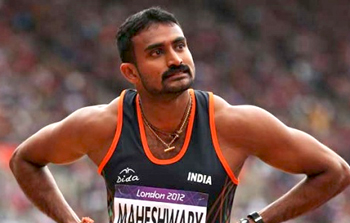 New Delhi, Dec 22: Doping shame and administrative goof-ups dominated the Indian athletics scene with the hosting of Asian Championships for only the second time in its history providing the only silver lining in an otherwise disappointing year.
New Delhi, Dec 22: Doping shame and administrative goof-ups dominated the Indian athletics scene with the hosting of Asian Championships for only the second time in its history providing the only silver lining in an otherwise disappointing year.
Athletics remained one of the top two disciplines which produced the most number of dope cheats in the tests conducted by the National Anti-Doping Agency with 23 from track and field returning positive.
India also faced embarrassment just a day before the start of the July 3-7 Asian Championships in Pune when shot-putter P Udaya Laxmi had to be pulled out after it came to be known that she had returned positive for stimulant methylhexaneamine in a test conducted by NADA during National Inter-State Championships in Chennai in June.
The AFI faced further shame as it tried to include quartermiler Ashwini Akkunji into the women's 4x400 relay team, just a few days after she ended her two-year ban period for a doping offence in 2011.
The technical delegate of the Championships politely rejected India's request.
National record holder triple jumper Renjith Maheswary found himself embroiled in a controversy, due to a five-year old doping incident, which eventually stopped him from being honoured with the Arjuna Award in humiliating circumstances just hours before the award ceremony.
After days of agonising wait, the Sports Ministry found out that Maheswary indeed failed a dope test during the Kochi Nationals in 2008.
The Sports Ministry came down hard on the Athletics Federation of India for failing to furnish critical information about Maheswary's dope flunk and the apparent suppression of facts related to a doping violation in its recommendation of the athlete for Arjuna Award in 2011, 2012 and this year.
Initially, the AFI was in denial mode even about the positive test, but informed the Ministry later that there indeed was a dope violation at the Kochi Nationals, though it could not locate the files.
A letter the AFI wrote to the Railway Sports Promotion Board -- Maheswary's employers -- in January 2009, informing it of the suspension of the athlete, turned out to be the most authentic piece of evidence in the complicated case.
Maheswary's case came just a month after another major administrative goof-up by the AFI during the August 16-28 Asian Youth Games in Nanjing, China. 17 Indian track and field athletes were thrown out after the AFI sent over-age participants.
Participants in athletics and weightlifting were required to be born on or after January 1, 1997 though the age criteria for other disciplines were different.
The AFI officials, despite the competition manual clearly stating that the participants should be of Under-17, included 17 over-age athletes -- those born in 1996, and they were disqualified by the organisers.
A furious Sports Authority of India asked an explanation and demanded compensation of Rs 10 lakh it had spent for the travel expenses of the disqualified athletes.
On the brighter side, India hosted the 20th Asian Championships in Pune, for only the second time after New Delhi hosted the continent's top event in 1989.
But the hosts could pick up just two gold medals (though third highest medal tally of 17) to finish sixth in a Championship which lost much of the sheen with Asian leaders China sending a contingent without some of their top athletes.
Stars like 2012 London Olympics bronze-medallist high jumper Mutaz Essa Barshim of Qatar and London silver medallist discus thrower Ehsan Hadadi of Iran also decided to skip the event.
Despite sending a depleted team, China ran away with top honours with 16 gold, six silver and five bronze, while Bahrain and Japan came second and third respectively.
Ace discus thrower Vikas Gowda and the women's 4x400m relay quartet of M R Poovamma, Tintu Luka, Anu Mariam Jose and Nirmala won gold to salvage some pride for India while the likes of Krishna Poonia (women's discus throw) and Sudha Singh (women's 10,000m race) flopped in the five-day event.





Comments
Add new comment